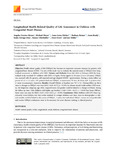Longitudinal health-related quality of life assessment in children with congenital heart disease

View/
Use this link to cite
http://hdl.handle.net/2183/31168
Except where otherwise noted, this item's license is described as Creative Commons Attribution 4.0 International License (CC-BY 4.0)
Collections
- Investigación (FCS) [1293]
Metadata
Show full item recordTitle
Longitudinal health-related quality of life assessment in children with congenital heart diseaseAuthor(s)
Date
2020-09-07Citation
Fuentes-Moure A, Meyer M, Häcker AL, Reiner B, Brudy L, Pértega-Díaz S, et al. Longitudinal health-related quality of life assessment in children with congenital heart disease. Congenit Heart Dis. 2020;15(4):217-227
Abstract
[Abstract] Objective: Health-related quality of life (HRQoL) has become an important outcome measure for patients with congenital heart disease (CHD). The aim of this study was to evaluate the natural course of HRQoL from longitudinal assessment in children with CHD. Patients and Methods: From July 2014 to February 2020 this longitudinal study recruited 317 children with CHD (113 girls, 35.6%) aged 6 to 18 years (11.6 ± 2.9 years). HRQoL was assessed with the generic, self-reported and age-adapted KINDL® questionnaire. During a mean follow-up period of 2.2 ± 1.3 years, 195 patients had one HRQoL reassessment, 70 two, 40 three and 12 patients four or more re-assessment, respective. Results: Overall HRQoL at baseline was 78.7 ± 9.3. During follow-up there were no changes in HRQoL over time (0.03 [–0.01–0.07]; p = 0.195). In a linear mixed model neither CHD severity, the diagnostic subgroup, age, BMI, surgical history nor gender could be linked to a change in HRQoL during the follow-up time. Only children with higher age baseline (–0.48 [–0.85––0.11]; p = 0.010) had lower HRQoL. Same trend was seen for BMI (–0.19 [–0.41–0.03]; p = 0.099). Conclusion: Older children with CHD have significantly worse HRQoL, but they evolve similarly to younger children over time. Since no demographic or clinical variable could be linked to the course of HRQoL, it seems that individual HRQoL courses are not predictable and routine HRQoL evaluations seem to be necessary for acute decision making in clinical practice.
Keywords
Health-related quality of life
Longitudinal
Serial
Children
Congenital heart disease
Longitudinal
Serial
Children
Congenital heart disease
Editor version
Rights
Creative Commons Attribution 4.0 International License (CC-BY 4.0)
ISSN
1747-079X






